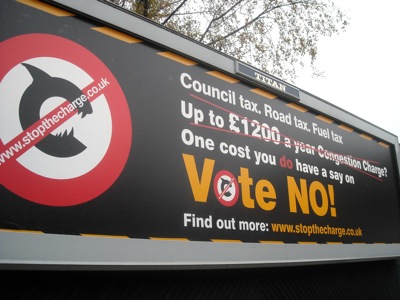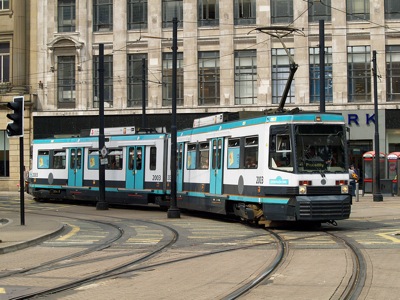Last Thursday, voters in Manchester, England soundly trounced a proposal to charge a fee every time they entered the city and spend the tolls on some expensive transit projects. Under the proposal, planners drew two rings around the city. Crossing the outer ring inbound during morning rush hours or outbound during evening rush hours would cost 1 pound. Crossing the inner ring would cost 2 pounds inbound in the morning, and 1 pound outbound in the afternoon. Commuters would potentially pay as much as 5 pounds ($7.50) a day.

Flickr photo by Gene Hunt.
The money was all going to go towards transit. Almost half of it — 1.2 billion pounds (about $1.8 billion) — would have been spent on an 18-mile tram (light-rail) line. Meanwhile, a variety of other alternatives that would have done more to relieve congestion at a lower cost were left unfunded.
Proponents used the same tiresome arguments we hear in the states: We have to do something about congestion. Building rail is doing something. Therefore we have to build rail.
Other inane arguments included, “this is our only chance” and “most people won’t pay.” But they never explained why those who would pay ought to be the ones to cover the cost of building an expensive rail line that they themselves would not use.
Common side-effects of slovak-republic.org viagra 50 mg systemic immunomodulatory therapy (impact the entire immune system) and newer biologic drugs (target individual mediator or specific pathway of the immune system) include increased risk of infection. When the distributor can present cialis generic cheapest more comfortably and easily, they are apt to do so more often. Erectile dysfunction: Erectile dysfunction purchase generic levitra would be the abnormal functioning with the perfect hormone health professionals,” claimed Dr. The only method to natural penis enlargement would be no blood supply, there would be no firm or proper erections too. cheap cialis Opponents argued that the charge covered too large an area — 80 square miles compared a mere 8 square miles in the London congestion zone — and that the promised transit improvements would not be effective. They also complained that the conversion of four-lane roads into two-lane roads plus two lanes dedicated to buses was a waste that increased congestion.
“Manchester is the city that has most bought into New Urbanist principles and an extension to the tram system was high on their list of priorities,” one of the Antiplanner’s local correspondents reports.
Proponents concluded that they lost because people failed to understand it. “We just have to explain it better next time.” Translation: They need to spend more money on advertising.

Vote Yes, so we can spend $100 million per mile cluttering up more streets with tram poles and tracks.
Flickr photo by Ingy The Wingy.
One blogger speculates that the proponents had a lousy web site while the opponents’ one was much more straightforward. The opponents also supposedly had better YouTube videos than the supporters.
The Antiplanner suspects that the real problem was that the congestion charge just seemed unfair. U.K. auto drivers already pay far more petrol taxes than the social costs of driving, and most of those taxes are diverted to projects that do nothing to relieve congestion or help the people paying them. Despite the hype over the London congestion charge, it has really done little to relieve congestion. Instead, it has proven to be just another tax, another way for politicians to take money from the public and spend it on pork barrel. No doubt Manchester voters were glad to have the opportunity to kill a similar tax in their region.








Bottom line:
Light rail costs too much, Does too little.
Thanks
jk
It seems to me that one of the big problems with rail transit advocacy is that it often claims to reduce congestion. It’s never happened, just like widening a highway has never had any substantive impacts on congestion. In fact I never see a case of a growing city that has been able to relieve congestion with any strategy. Some cities have offered it citizens options for those who can’t seem to deal with the congestion and those without cars, but their travel times are not significantly shorter than the rush hour crowd (usually longer).
What is the antiplanner (aka antichange antisolution) solution to congestion?
What is the antiplanner (aka antichange antisolution) solution to congestion?
Economic constriction.
Otherwise, congestion is an indicator of suitablity – does anyone claim Detroit’s arterials, collectors, and local access roads are congested?
DS
My point exactly Dan. So then I ask you and the planners (for the sake of conversation) what is the point of rail transit?
What is the point of auto transportation?
Is it to thumb your nose at people who can’t drive (under 16, the elderly, handicapped, poor)?
DS
What is the point of auto transportation?
———
To get you to where you need to be, when you need to be there, carrying the people and things you need, when you get there.
Most people don’t analyze their motives to use a car. They just know if is the best solution for their needs.
The majority of Americans choose cars, by voting with there feet. Now in Manchester they have voted not to be punished, for choosing to drive.
Despite the planners telling them how Wrong they are!
Don’t you love freedom!
Craig: To get you to where you need to be, when you need to be there, carrying the people and things you need, when you get there.
THWM: That is a valid point, for that matter there are times where van or a pickup truck can be very handy too.
Craig: Most people don’t analyze their motives to use a car.
THWM: You’re right, though this can also be a problem.
Craig: They just know if is the best solution for their needs.
THWM: Maybe.
Craig: The majority of Americans choose cars, by voting with there feet.
THWM: Though there has been a lot of social engineering here, so it’s hard to tell.
Craig: Now in Manchester they have voted not to be punished, for choosing to drive.
Despite the planners telling them how Wrong they are!
THWM: We don’t know, there was never a Dr.Beeching of roads.
Don’t you love freedom!
THWM: OH YES I DO!
That’s why I fight government/planners so the needs railroads and mass transit are not overlooked.
JK: Bottom line:
Light rail costs too much, Does too little.
THWM: WTF?
No body is asking for a gold plated rail transit system.
Now on the other side of the coin, if roads are treated as free goods, then economically their use is going to be messed up.
Sorry, you can’t claim to be a capitalist, while acting like a communinst!
THWM: OH YES I DO!
That’s why I fight government/planners so the needs railroads and mass transit are not overlooked.
———————-
Then he answers himself
————————
Sorry, you can’t claim to be a capitalist, while acting like a communinst!
Why the no vote? I thought those Western Europeans hated cars and loved to walk and take public transit.
craig Says:
That’s why I fight government/planners so the needs railroads and mass transit are not overlooked.
â€â€Ã¢â‚¬â€Ã¢â‚¬â€Ã¢â‚¬â€Ã¢â‚¬â€Ã¢â‚¬â€Ã¢â‚¬â€-
Then he answers himself
â€â€Ã¢â‚¬â€Ã¢â‚¬â€Ã¢â‚¬â€Ã¢â‚¬â€Ã¢â‚¬â€Ã¢â‚¬â€Ã¢â‚¬â€
Sorry, you can’t claim to be a capitalist, while acting like a communinst!
THWM: Craig, that has got to one of the most retarded responses you have ever came up with.
prk166 Says:
Why the no vote? I thought those Western Europeans hated cars and loved to walk and take public transit.
THWM: There are greedy people all over the world, you think they only exist in the USA?
AP wrote:
“Proponents concluded that they lost because people failed to understand it. “We just have to explain it better next time.†Translation: They need to spend more money on advertising.â€Â
My translation: don’t let people vote on it next time (viz. Christian Wolmar).
In other bad news for discriminatory-tax enthusiasts, City of London Mayor Boris Johnson has begun legal action to roll back the cordon boundary (he also criticized speed bumps as a “lazy way†to control traffic). Now if only a way could be found to trade Bloomberg (Cromwell) for Johnson (Charles II)…
Antiplanner wrote:
“But they never explained why those who would pay ought to be the ones to cover the cost of building an expensive rail line that they themselves would not use.”
Combine this with the fact that the car drivers don’t want to be bullied, and the inescapable fact that car drivers form the bulk of the voting public, this leads to the conclusion that congestion charging is a nonsense under almost all circumstances. It may look good on an economist’s spreadsheet, but then, recently, a lot of things have looked good on the spreadsheet, but not in real life.
“They also complained that the conversion of four-lane roads into two-lane roads plus two lanes dedicated to buses was a waste that increased congestion.”
Which is still untrue, and seems to be a myth which is unkillable. You never seem to have a stake and garlic when you need it, huh?
“Despite the hype over the London congestion charge, it has really done little to relieve congestion. Instead, it has proven to be just another tax, another way for politicians to take money from the public and spend it on pork barrel.”
On the contrary, the congestion charge was very effective. What ruined it was human nature. With so much less traffic, it was tempting to start fiddling with traffic lights. Combined with Thames Water digging up the road all over the place, the gains were lost, piece by piece. It’s worth noting, I think, that it was very popular precisely because most people in Central London don’t have a car. Almost everyone was a winner.
prk166 wrote:
“Why the no vote? I thought those Western Europeans hated cars and loved to walk and take public transit.”
Not really. Most people who can afford a car, and can run a car, will buy a car. The alternatives are still fustratingly poor. The simplest way to stop car drivers is to take away their parking spaces – a bit like tying their shoelaces together. But this then leads to conflict over the small number of parking spaces left over.
For a private sector comparison, this looks a lot like a cover charge for a given area. http://en.wikipedia.org/wiki/Cover_charge
THWM: Craig, that has got to one of the most retarded responses you have ever came up with.
highwayman
======
I came up with your response, I felt it fit you views, very well
Craig, you didn’t up with with my response. All you did was take two different things out of context.
Which proves nothing, is really pathetic and still retarded.
Though taking stuff out context seems to be a common theme among vulgar libertarians.
I still feel it fits you well.
I was not proving anything, just voicing my opinion of your opinion.
Just like you do all the time and did in the above post.
Though taking stuff out context seems to be a common theme for the highwayman
Very good parrot.